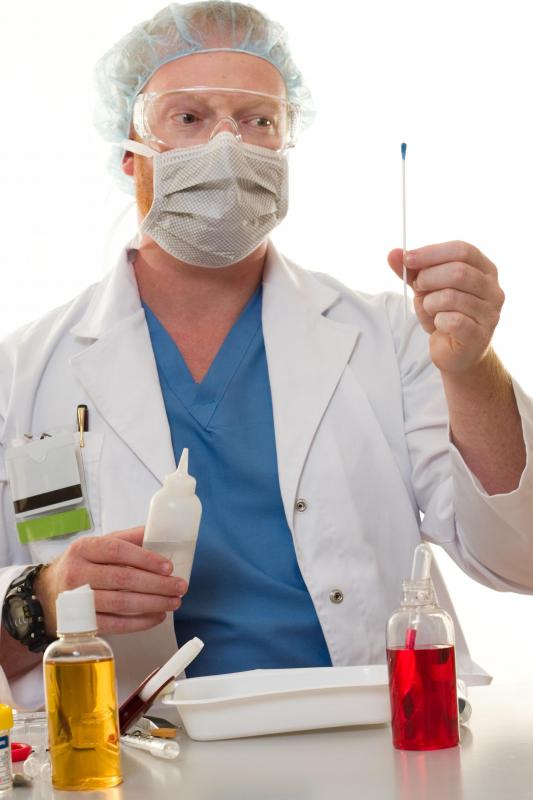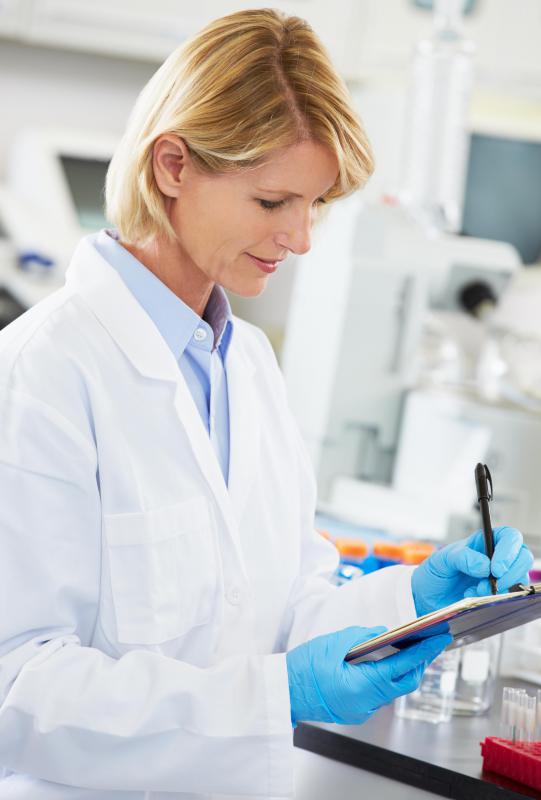At PracticalAdultInsights, we're committed to delivering accurate, trustworthy information. Our expert-authored content is rigorously fact-checked and sourced from credible authorities. Discover how we uphold the highest standards in providing you with reliable knowledge.
What does a Biotechnology Technician do?
A biotechnology technician is a person who typically works in a laboratory assisting scientists in the research, development, and testing of various forms of biotechnology. Although a technician’s specific duties may vary, they are usually responsible for setting up the lab, trouble-shooting equipment problems, and preparing solutions for scientific tests. Technicians may also perform simple scientific procedures and collect and record the data from these procedures. These technicians may work in many different areas of biotechnology and have a variety of job titles such as agricultural and food science technician, biological technician, or chemical technician, A biotechnology technician may also be employed as an environmental science technician or a forensic science technician.
A biotechnology technician working in the area of agricultural and food science is usually involved in many kinds of animal, fiber, or food research. These technicians typically conduct experiments and other tests in order to improve the quality and yield of various crops. They also assist scientists in experiments to increase resistance to insects and diseases in certain kinds of plants and animals. Some technicians may be used to breed different types of animals for nutrition experiments. Agricultural technicians are also responsible for analyzing, recording, and compiling test results, as well as cleaning and sterilizing laboratory equipment.

Technicians who work in the biological science field usually assist scientists who are conducting different types of medical research in order to find cures for certain diseases. They may also work for a pharmaceutical company helping to develop new medicines and vaccines. Technicians who work in the field of microbiology may also analyze different organic matter such as food or blood.

A biotechnology technician working in the chemical industry will typically assist a chemical engineer or chemist in the development of new types of chemicals or other related products. Technicians who are involved in certain types of research and development projects may be used to collect and analyze water or air samples to determine pollution levels.

Technicians employed in environmental science are usually responsible for monitoring various environmental resources. These technicians typically perform various types of field and laboratory tests to help determine possible sources of pollution in the environment. Environmental technicians are also used in the control and management of hazardous materials.

Biotechnology technicians working in forensic science typically collect and analyze physical evidence obtained from crime scenes. These technicians are often specialists in areas such as firearms or DNA analysis. Forensic technicians are also used to prepare reports for investigators and may be called upon to testify in court as an expert witness in certain types of criminal cases.
AS FEATURED ON:
AS FEATURED ON:


















Discussion Comments
And it's not like these would all be white mice either. Rats are very intelligent, very sweet animals and the idea of raising them and then having to watch them be experimented on, sometimes for research that was fairly trivial, would really bother me. So, I passed on the job. It's definitely an aspect that you would want to consider when thinking about working in this field.
@Iluviaporos - It's getting more and more difficult to find that kind of job though. There are so many recent graduates with degrees, or even just diplomas that it's difficult to compete with them if you don't have one.
I mean, if a science graduate is applying for the technician job and they have a degree and you don't, all other things being equal, why wouldn't they get the job? If you want to have a biotechnology career, you really need to think about getting some kind of credential.
There are plenty of programs what will let you, or require you to work in an internship position as part of the study and that can help as well. Just make sure the study you are doing is very practical, as often employers complain that the people they hire fresh out of university have no ability to function in a real lab.
Biotechnology technician jobs are often advertised as entry level positions and some of them don't require a science degree, so if you want to work in the field of science but don't want to get a degree, this can be a good way to do it. I have a friend who managed to get a job like this and they are actually paying for him to take classes at the local university so that he can eventually achieve a degree.
That's optional though, and more to do with where he's hoping to take the job one day than what he needs to know for the job he's doing. After all, most of what he's doing is scientific grunt work. There's no analysis or anything like that. He just has to record observations and do anything else that he's told, to leave the scientists free to do the harder jobs.
Post your comments